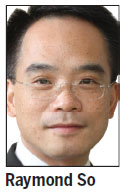Control of power tariff a double-edged sword
Updated: 2014-12-30 09:56
By Raymond So(HK Edition)
|
|||||||||
Last week the two power companies (Hongkong Electric Company and China Light and Power) announced price increases for the coming year. The HEC will freeze the prices while CLP will have an increase of 3.1 percent. Public reaction to this development, given the marginal rise in the power tariff, was relatively mild. Besides, media attention was focused on important social issues recently. Still, the relative absence of media coverage, except for a mention in news briefs, is unusual. An increase in the tariff has always attracted criticism in recent years.
Power companies have begun to appreciate that a tariff increase is not welcomed by the public, especially given their experience with the previous government. The two power companies have done a lot of public relations work. For example, in its earlier development plans, HEC showed future tariff levels as comparable with current ones. CLP, on the other hand, projected a substantial rise in the electricity tariff in future. When the real increase is much less than expected, the two power companies face much less pressure, naturally. Moreover, the two power companies put more resources into promoting their public image. Both are positioning themselves in a big way through the media. Enhancing soft skills was another area of focus. Granted, the hike appears to be nominal, but certain issues related to it need greater attention.
Over the years, the price-setting mechanism has been questioned. As we all know, the tariff chart is drawn in accordance with a return on assets within the Scheme of Control Agreements (SCA). Although this arrangement should set the upper limit on profits that the two power companies can earn, because "excess profits" will be transferred to the tariff stabilization fund. However, in actual terms, the permitted rate of return is also the "reasonable" expected return of the two power companies.

In other words, if the returns of the two power companies do not reach the permitted rate of return, the two power companies can use this as a reason to increase electricity tariff. Under SCA, this arrangement is actually a double-edged sword. When the two power companies record good performances in their books, the restrictions on profits can prevent a sharp increase in the power tariff. However, even in times of unsatisfactory performance, SCA keep justifying tariff hikes, year after year. Even when they make profits, the two companies put aside making huge capital investments, and the rate of return may not be high. The public finds it difficult to understand why the two power companies earning billions in profits keep complaining about the apparent difficulties they face and ask for tariff increases. From the company's point of view, asking for a permitted rate of return within the framework of SCA is not wrong, but it is unacceptable to a section of the public, even though the increase is less than the inflation rate.
While SCA has its shortcomings, it also has its positive side. In the 1960s, when Hong Kong was undergoing rapid industrialization, SCA provided a stability factor in electricity development in Hong Kong. However, given the huge investment in the electricity market and also that the returns could take a long time to be realized, power companies need incentives to improve the power supply system. SCA plays an important role in providing economic incentives, to help motivate power companies to meet targets set by the government.
Of course, it does not mean that SCA is above criticism. It has drawn flak for being tipped on the side of the power companies since the 1970s, but the situation is even more complicated now. The SCA are legal documents which the two power companies and the government have to comply with. As for the investors, SCA is a way of monitoring the management's performance. If the power companies do not follow the provisions listed in SCA and maximize the benefit of the shareholders, the management will treat it as dereliction of duty.
In 2018 the existing SCA will expire. Which direction should our electricity market be heading? Should we improve the existing SCA, or not make too many changes? I believe this will be an important factor in deciding the way the electricity market is headed.
The author is dean of the School of Business at Hang Seng Management College.
(HK Edition 12/30/2014 page10)